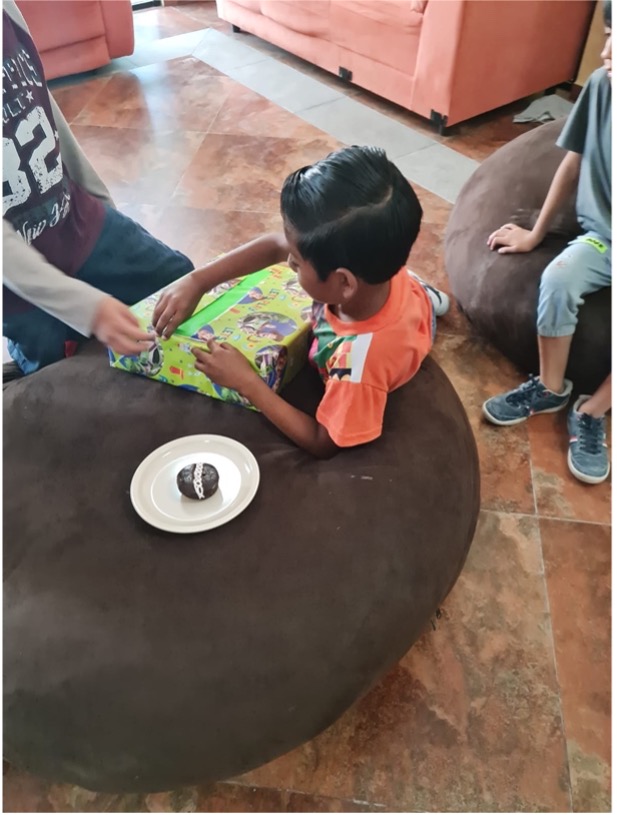In 2021, Back2Back staff saw a pattern developing within the community of teens they served. There were young men getting in legal trouble with very few safe adults to speak positively on their behalf, and they knew something needed to be done.
The Juvenile Justice Program in Cincinnati started at a local gym. A trainer who worked there left his job and partnered with a local pastor to begin ECJI – Empowering Community Justice Initiative, and Back2Back Cincy wanted in.
“ECJI is about galvanizing leaders from within their own communities- teachers, business owners, or neighbors,” explained Michael Sickles, Back2Back staff, “and encouraging their involvement by writing letters, showing up in court and advocating on behalf of the accused teen.”
In the state of Ohio, any time there is a violent crime or higher felonious assault involving a weapon, the courts often try defendants as adults. With the help of ECJI and participatory defense hubs, youth have voices speaking on their behalf, defending their right to be tried as juveniles.
“The participatory defense hubs allow community members, the defendant, and their family to come in, hear the facts of the case, learn the court process, what their rights are, and what to expect in trial,” explained Michael. “It is a team effort – the public defenders are no longer enemies or seen as ill-equipped, but as safe people coming alongside families in trying times.”
Back2Back Cincy’s role is two-fold. They step in as part of the hubs, giving voice to reasons why juveniles should remain in juvenile court for sentencing, but they also invite the defendant and their family into programming. They’re offered crisis coaching and given a crisis care coordinator to help the court system see the individual for who they are, not just what they’re being charged for.
“We’re humanizing the young people, highlighting their trauma, and explaining how it impacts decisions they’re making,” explained Michael. “If they are tried as adults, they never get the opportunity to access care, heal their brains and bodies, and return to society ready to reintegrate.”
When traumas are addressed and managed by safe, professional adults, cycles of incarceration are broken. This is the fight ECJI and Back2Back Cincinnati are in – ensuring children are seen as children in need of assistance and safety, not cyclical criminals.
The efforts of ECJI have collectively given back over 30 years to youth who would otherwise be tried as adults and sit behind bars without resuscitation. Back2Back Cincinnati has worked with ECJI on six cases specifically and have saved 15 years of life for juveniles in the city.
–
Two young men in the Juvenile Justice Initiative meet with Stephanie Powers, Back2Back staff and Licensed Social Worker, to talk through their narratives through Making Sense of Your Worth, a curriculum through Halo Project. It is an eight-week process wherein young men and women unpack lies about themselves and their stories.
“The two young men I meet with were recently unfocused, bouncing around, kept asking if they could go home,” shared Stephanie. “It was clear they were not in the headspace to engage in the emotional work required of our usual time together.” She took a few deep breaths to regulate herself and then she asked one simple question.
“What do you want to talk about?”
Her simple question unlocked something in each of the young men, creating a space of safety for them to share freely within. “Loss was a topic they both dove into and were feeling deeply,” shared Stephanie. “This is a common theme in my time with the teens we serve; many have experienced gun violence or separation as a result of incarceration. Loss is a very real, tangible part of their everyday lives”
Eventually, one of the teens looked at her and said, “You don’t know what it feels like to go through what we go through everyday! How can I believe there’s a God when so much goes wrong? I don’t feel Him, even when I want to.”
Stephanie felt the heaviness of his words settle around them. She felt their great desire for justice, prevention. She and fellow staff member, Onice Gray, took the opportunity to share where they each find hope in the Gospel story. “Sin is in the world, so we are separated, but we get to choose if we have a meaningful relationship with God,” they shared.
One young man looked up as they finished sharing. “I want to believe, because if I don’t, it just ends. But why does He allow loss, death, punishment and also offers love and kindness?”
Onice and Stephanie knew they weren’t going to have all the answers to their questions and they know each teen experiences a chronic fear of whether they’ll be the next to lose something, or someone.
“We are not present to debate or convince anyone of God’s existence and love,” they shared. “But we will tell you why we believe what we believe.”
Their time together ended shortly after, but since then, the teens have returned and continue to ask the hard questions. This is the power of the Juvenile Justice Initiative and of the emotional work each child and teen in Cincinnati is investing in – they know who is safe to speak to and where the safe spaces are for them to go when everything in their world feels upside down.
Please continue to pray alongside Back2Back Cincinnati as staff goes deeper with every child they serve, understanding meaning behind every behavior, and working to ensure every young man and woman knows they are seen, known, and loved.

